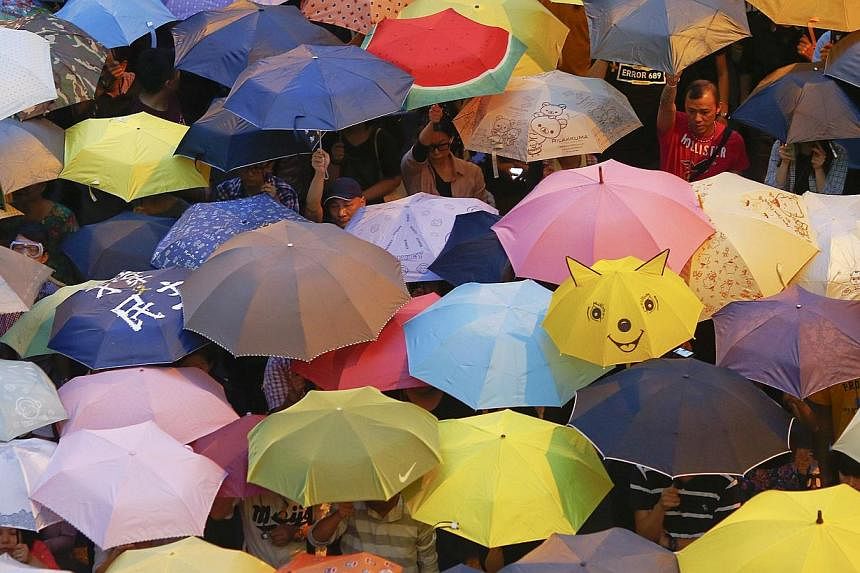HONG KONG (AFP) - Hong Kong democracy activists on Tuesday marked one month of mass protests as student leaders said they would consider asking senior Chinese Communist party officials to meet them directly, the first time such a request has been made.
Thousands gathered for an evening rally at the main protest camp, unfurling umbrellas to mark the moment a month ago when police fired tear gas at largely peaceful crowds - kickstarting the most concerted challenge to Beijing since the bloody 1989 Tiananmen protests.
As protesters streamed into the site Alex Chow - president of the Hong Kong Federation of Students (HKFS) - said he would seek a meeting with China's Prime Minister Li Keqiang if the Hong Kong government failed to deliver their demands to the mainland authorities.
Parts of the semi-autonomous Chinese city, an Asian financial hub, have been paralysed by a month of mass rallies and roadblocks.
Protesters want China to rescind its decision in August that all candidates in elections for the city's leader in 2017 must be vetted by a loyalist committee - an arrangement demonstrators deride as "fake democracy".
Tentative talks between the government and student leaders last week made little headway. The government offered to write a report to Beijing on events since protests began and to set up a committee with demonstrators to discuss further constitutional reform.
But Chow Tuesday said any report must include a direct request from the city authorities calling on mainland authorities to withdraw their August decision.
"If the Hong Kong government has difficulty meeting our demands, we sincerely hope that arrangements could be made for us to directly meet with premier Li Keqiang as soon as possible," Chow said.
It is the first time students have officially broadcast the idea of going to straight to Beijing to negotiate.
Their request echoes the Tiananmen protests when student leaders eventually met with then-premier Li Peng for what turned out to be fruitless talks.
On June 4 the movement was brutally crushed by the military, with hundreds - and by some estimates thousands - killed.
Organisers of the Hong Kong demonstrations have been hoping to inject new momentum into the movement after reaching an impasse with the government and seemingly struggling to decide how to proceed.
The protests have been dubbed the "Umbrella Movement" following the creative ways demonstrators used them to shelter from the heat, torrential rain, pepper spray and police batons.
Tuesday's rally opposite the city's government headquarters started with an 87-second silence at 5:57 pm.
At that time on September 28, riot police shot the first of 87 canisters of tear gas at crowds who had taken over a highway near the city parliament.
Participants for Tuesday's gathering were told to bring the masks, goggles and protective clothing they wore that day as well as umbrellas.
The decision to launch tear gas backfired, drawing tens of thousands of sympathisers onto the streets and fuelling a movement that has defied many expectations both for its size and longevity.
But the Chinese government has shown no sign of backing down. At the same time, the movement's leaders are aware the disruption caused by their roadblocks has created mounting public frustration.
Occupy's co-founder and university professor Benny Tai said Tuesday he planned to spend more time away from protest sites and return to teaching, but insisted it was not a retreat.
But many of those gathered for the rally said they could not leave the streets until genuine democratic progress was made.
"We can't retreat because we haven't got anything yet," 52-year-old computer programmer Any Ho told AFP. "Democracy cannot be taken for granted. We have to be persistent for it to come."
The city's Beijing-backed leader Leung Chun Ying has seen his popularity nosedive during the crisis. A new poll by the Chinese University of Hong Kong showed Leung now scores 38.6 on an approval scale among voters which runs from 0 to 100 - his lowest since taking office in 2012 when his score was 53.9.

